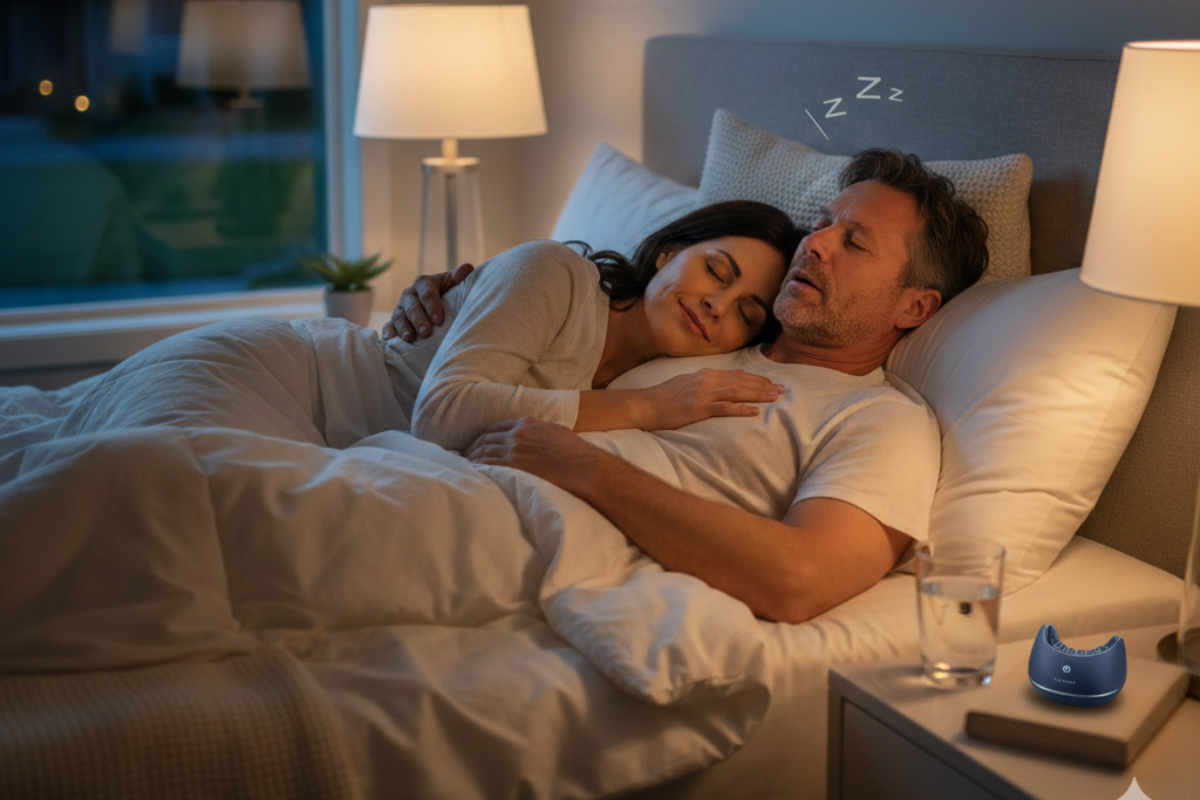Free Shipping - On Orders Over $99 (USA, Canada, UK, & AU)

5 Ways to Stay Zen this Holiday Season for Better Sleep
December 03, 2024 3 min read
The holidays are meant to be joyous, festive, and comforting. But for many of us, they can turn out to be quite stressful.
From long-distance traveling and overspending on gifts to enduring awkward and intrusive dinner conversations and never-ending party hopping, the festive season can definitely become too much. And because stress is the main cause of sleep disturbances, many of us see our sleep suffer as a result.
But there are ways to maintain your “zen” during winter celebrations and not sacrifice your sleep. Here are 5 tips that can help you change the narrative this year and make the holidays what they’re meant to be — relaxing.
1. Set Time Aside for Yoga
Practicing yoga regularly promotes strength, endurance, and flexibility, as well as friendliness, compassion, and self-control while enhancing a sense of calmness and well-being [1]. This is because yoga asanas produce a physiological state opposite of the flight-or-fight response. In other words, yoga can reduce stress.
While the usual recommendation is 30 minutes of hatha yoga sequence to see the full effect, a short 10-minute sequence such as the sun salutation can work wonders as well. A study carried out during the pandemic found that 10 minutes of daily yoga reduced mental discomfort in workers [2].
2. Practice Mindfulness
To truly stay “zen” in the midst of holiday chaos — and really at any other time — you need to get a hang of mindfulness. Mindfulness is the practice of being fully aware of the present moment. There are many different ways to practice mindfulness, from breath awareness and progressive muscle relaxation to mantra-based and transcendental. All meditation techniques increase mindfulness.
And while mindfulness techniques vary, they all involve deep breathing and increasing your awareness of body and mind. So, when family members get into a heated discussion during Thanksgiving dinner, take a deep breath and pay attention to your body, thoughts, and surroundings.
3. Watch What You Eat
It can be incredibly difficult to stick to healthy eating habits during the holidays. But overdoing it with calorie-dense, sugar-rich, and processed food and drink will place stress on your body and mind. Diet and stress are strongly linked, with stress leading to poor eating habits and vice versa [3].
Researchers believe that diets that increase inflammation can negatively change your mood. Poor dietary choices may also your gut microbiome, which plays an important part in brain function, mood, and behavior via the gut-brain axis. Research has also noted a strong link between binge eating and poor sleep [4].
4. Make Sleep a Priority
It’s next to impossible to keep your cool when sleep-deprived. That’s because the sleep-deprived brain does not function optimally, making you lose focus, have trouble making sound decisions, and become more aggressive and irritable than usual [5].
The only way to avoid sleep deprivation during the hectic and busy holiday season is to prioritize sleep. Ways to do that are by keeping food portions small and limiting alcohol, avoiding staying up late, limiting screen time in the evening, and sticking to a consistent sleep schedule.
5. Pay Attention to Your Health
As the saying goes “ a healthy mind in a healthy body.” Undiagnosed or untreated health problems, no matter how benign, can affect your well-being and your sleep. While many things go by the wayside under the strain of holiday stress, your health shouldn’t be one of them.
And if the health problem in question has to do with sleep, then you want to map out a plan to not let sleep suffer so you can actually enjoy the holidays. If you have sleep apnea, do bring your CPAP with you, and don’t be shy to use it during a long flight. For mild cases of snoring or sleep apnea, mouthpieces like the Good Morning Snore Solution.
References:
- Woodyard C. Exploring the therapeutic effects of yoga and its ability to increase quality of life. Int J Yoga. 2011;4(2):49-54. doi:10.4103/0973-6131.85485
- Garcia MG, Estrella M, Peñafiel A, Arauz PG, Martin BJ. Impact of 10-Min Daily Yoga Exercises on Physical and Mental Discomfort of Home-Office Workers During COVID-19 [published online ahead of print, 2021 Oct 1]. Hum Factors. 2021;187208211045766. doi:10.1177/00187208211045766
- Bremner JD, Moazzami K, Wittbrodt MT, et al. Diet, Stress and Mental Health. Nutrients. 2020;12(8):2428. Published 2020 Aug 13. doi:10.3390/nu12082428
- Trace SE, Thornton LM, Runfola CD, Lichtenstein P, Pedersen NL, Bulik CM. Sleep problems are associated with binge eating in women. Int J Eat Disord. 2012;45(5):695-703. doi:10.1002/eat.22003
- Orzeł-Gryglewska J. Consequences of sleep deprivation. Int J Occup Med Environ Health. 2010;23(1):95-114. doi:10.2478/v10001-010-0004-9
Also in Blog

Healthy Sleep Goals For 2026
December 22, 2025 6 min read

💨 Are Your Nighttime Breathing Issues Robbing You of Your Health and Your Energy?
December 12, 2025 3 min read
Breathing issues during sleep, collectively known as sleep-disordered breathing, are a major public health concern.

Is Your Snoring a Sign of Something More Serious? Unpacking the Science of Sleep
December 05, 2025 3 min read
When you snore, what's actually happening?
Join our Insiders Club
Every week you will receive specials, discounts, and giveaways.
Categories
- Better Sleep
- depression
- Fitness
- funny animal
- Global Citizenship
- health
- Mental Health
- mouthpiece
- nutrition
- pillow
- Productivity
- relationships
- sleep
- sleep apnea
- sleep deprivation
- Sleep Tech
- snoring
- snoring humor
- snoring jokes
- snoring sounds
- stop snoring
- StopSnoringStartLiving
- technology
- Tongue displacement
- travel
- video
- Young Adult

